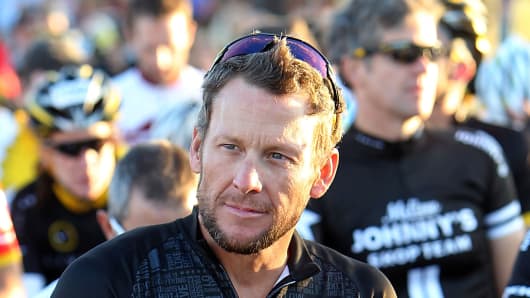While he can't save his career or his fortune, an admission of doping might rehabilitate Lance Armstrong's charity and, ultimately, his legacy.
The road there is more uphill than a Tour de France route, though, and there's no drug that can give Armstrong, who was stripped of seven titles for that race last year, a boost for this trip.
The disgraced cyclist, who denied doping for more than a decade, admitted to using performance-enhancing drugs in an interview with Oprah Winfrey that will air in two parts Thursday and Friday, according to an NBC News source.
"Lance knows he's poison as is, and my guess is he believes if he apologizes... and cries big crocodile tears it won't solve his problems immediately, but it will at least start the process," said Richard Burton, David Falk professor of sports management at Syracuse University.
Although he earned millions in prize money from winning the Tour de France, Armstrong's brand value lay in endorsements.
"His brand value during his yellow jersey days was almost immeasurable," said Mark Serrano, CEO of ProActive Communications. "I think there were probably few brands in the world that were worth in excess of $20 million a year, and he was one of them."
Armstrong had deals with numerous companies, including Nike, Anheuser-Busch, Radio Shack and bicycle manufacturer Trek, all of which ended their associations with him after he was banned for life from competing in Olympic sports and was the subject of a brutal report by the United States Anti-Doping Agency.
(Read More: The Banker Who Put His Faith in Armstrong)
"Today we're looking at a brand value of near zero," Serrano said.
"He is starting to repair his own brand,'' New York Daily News columnist Mike Lupica told Matt Lauer on TODAY Tuesday morning. But Lupica characterized the expected admission as motivated by public relations and a desire for control, not heartfelt contrition.
"To me this is like some giant, athletic Ponzi scheme that went on and on and built and built,'' Lupica said.
While Armstrong's host of legal entanglements give him a motivation to implicate others who might have been involved in organized doping, Burton said pointing fingers won't do his image any favors.
The disgraced cyclist might be hoping that his admission will persuade the USADA to lift his lifetime ban against competing in triathlons or other events, but his cycling career is almost certainly over. "This may be a case of too little, too late," said Marcia Horowitz, senior executive vice president at public relations firm Rubenstein Associates.


